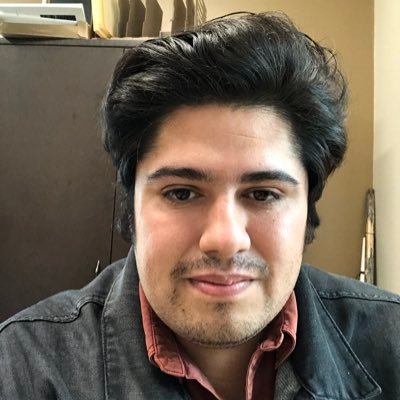ISSN: 1941-4137
POETRY THAT ENACTS THE ARTISTIC AND CREATIVE PURITY OF GLASS
POETRY THAT ENACTS THE ARTISTIC AND CREATIVE PURITY OF GLASS

J.J. Hernandez is a poet in Fresno, California. He holds an MFA in poetry and served as the inaugural fellow in the Laureate Lab:Visual Words Studio under Juan Felipe Herrera. His work has been supported by the Community of Writers Workshop, and you can see some of his work in Tinderbox, Queen Mob's Tea House, The Acentos Review, Crab Orchard Review, and forthcoming in The McNeese Review, and The American Poetry Review.
We Will Remain, and Continue to Remain
for G.A.
My drug dealer in San Francisco rolls up on a Scoot
& pulls out a bag of shrooms & a scale.
His scale is a libra in the historical context of the word.
He is a Libra in the astrological sense of the word.
Under-anticipating, I pay for a heroic dose. You’re
gonna melt, is all a libra man tells me,
& in summer, he rides his bike or takes the Scoot.
His van is only his home, not his means
of transportation. Sometimes walking in the city
is exhausting. We have drinks, I’m walking
with a quarter in my bag, I’m tired, it’s still
summer, & I’m still cold. I think about the sun
& intergenerational wealth. I think about how much
money the white man has taken from me. I think
about my Latinx drug dealer, who is so assimilated,
that he rides a road bike through Montana for fun. I like
to look at the astrological signs to give myself
something to believe in, but rather, they distract
me from what is actually true. The border
is always shifting, the landscape, though
beautiful, is not spiritual, & if that small breeze
that runs through the forest could speak, it would say,
you are putting children in concentration
camps, you are all going to die soon. A woman
with an American Standard Bible at my door asks me
if I think humans are getting worse, & I still, in my heart,
say no, I think humans just figured out the means
for destruction & will kill ourselves. I think
that’s a scripture, too: a means to an end. At Lake
Tahoe, a friend and I discuss intergenerational
trauma/wealth. These white people up here got mad
money & give it all to their children. If I had
children & mad money, I would probably
do the same. Another friend tells me I act
like a Gemini, which, to me, is funny, because
I contain the duality of a people who lived on
a liminal plane. In the liminal, a girl & her father
wash to the shore, dead, & we all forget about it,
because it’s time to watch the Democratic debates,
but a girl her father remain in that liminal river: dead.
A liminal space stops being a liminal space when you
commit to one of the sides. Say for instance, when
my father asked me, if I wanted to receive the holy
ghost. I was on the fence: liminality. But when I
committed to taking Christ into my tongue, I moved
out of that liminal space. So, when the Unites States
conquered my people, & we lost the land we owned,
we were forced to start over. Who wouldn’t go to Jesus
after losing it all? I am the son of miners, vaqueros,
& farmers. I am the border; I am still liminal.
You can take our language, but you can’t transfer the dirt,
The ground, it will blow and settle wherever it must.
This poem was written at the Community of Writers at Squaw Valley Summer Workshop, where I was devastated by the photo of a migrant father and daughter, who washed to the shore, dead. I then thought of a liminal river and the mythological and historical context of these liminal spaces as a Latinx person who grew up in the Southwest, which connected me to the linguistic terrorisms that Gloria Anzaldua explored, and how these linguistic terrorisms have been pushed into actual terrorisms. My last few lines and title are a nod to the end of "How to Tame a Wild Tongue," by Gloria Anzaldua, where she says, "Stubborn, persevering, impenetrable as stone, yet possessing a malleability that renders us unbreakable, we, the mestizas and mestizos, will remain."
Glass: A Journal of Poetry is published monthly by Glass Poetry Press.
All contents © the author.
All contents © the author.





